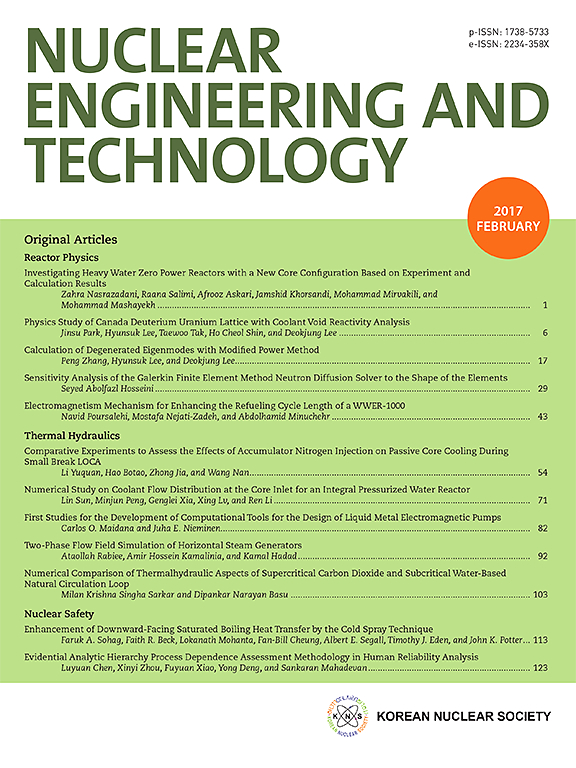重金属负荷对印度尼西亚 Reaktor Daya Eksperimental 升级版特殊核材料和废料的影响
IF 2.6
3区 工程技术
Q1 NUCLEAR SCIENCE & TECHNOLOGY
引用次数: 0
摘要
这项技术政策研究调查了鹅卵石燃料中的重金属装载量(HML)对印度尼西亚升级版鹅卵石堆设计--Reaktor Daya Eksperimental(RDE)--的特殊核材料(SNM)和废物量的影响。使用 OpenMC 进行了一组蒙特卡罗模拟,利用无限晶格反应堆计算模拟卵石燃料耗竭。这项研究考虑了在不同的 HML 值、可达到的排出燃料燃耗、80 GWd/MTU 的目标燃耗和不同的反应堆功率(10 和 40 MWt)下的 HML、燃料停留时间、剩余 235U、钚总量、中长期废物、贫化卵石数量和废物量。由于欠调节效应,较高的氢ML 量缩短了可达到的排出燃料燃耗水平,同时也降低了燃料利用率。HML 量增加 80% 会导致燃烧水平降低约 25%。假定采用五次加油计划,这将导致每年收集的剩余 235U 约增加三倍,钚增加 2.4 倍,中寿命废物增加 1.4 倍,长寿命废物增加 1.5 倍。研究表明,功率提升四倍,核 SNM 和废物数量就会增加四倍。本文章由计算机程序翻译,如有差异,请以英文原文为准。
Heavy metal loading effects on special nuclear material and waste of an uprated Indonesian Reaktor Daya Eksperimental
This technical policy study investigated the effect of heavy metal loading (HML) quantity in the pebble fuel on the special nuclear material (SNM) and waste quantities of an uprated Indonesian pebble bed reactor design, the Reaktor Daya Eksperimental (RDE). A set of Monte Carlo simulations, performed using OpenMC, was deployed to simulate the pebble fuel depletion using an infinite lattice reactor calculation. This study considers HML, fuel residence time, leftover 235U, total Pu, medium- and long-lived wastes, number of depleted pebbles, and volume of waste at different HML values, at attainable discharged fuel burnup, at a target burnup of 80 GWd/MTU and at different reactor powers (10 and 40 MWt). Due to an under-moderation effect, a higher HML quantity shortened the attainable discharged fuel burnup level, which also translated to a lower fuel utilization. An 80% higher HML quantity resulted in about a 25% lower burnup level. Assuming a five-pass refueling scheme, this resulted in approximately three times more leftover 235U, 2.4 times more Pu, 1.4 times more medium-lived waste, and 1.5 times more long-lived waste collections per year. The study showed that a power uprating by a factor of four increased the SNM and waste quantities by four times.
求助全文
通过发布文献求助,成功后即可免费获取论文全文。
去求助
来源期刊

Nuclear Engineering and Technology
工程技术-核科学技术
CiteScore
4.80
自引率
7.40%
发文量
431
审稿时长
3.5 months
期刊介绍:
Nuclear Engineering and Technology (NET), an international journal of the Korean Nuclear Society (KNS), publishes peer-reviewed papers on original research, ideas and developments in all areas of the field of nuclear science and technology. NET bimonthly publishes original articles, reviews, and technical notes. The journal is listed in the Science Citation Index Expanded (SCIE) of Thomson Reuters.
NET covers all fields for peaceful utilization of nuclear energy and radiation as follows:
1) Reactor Physics
2) Thermal Hydraulics
3) Nuclear Safety
4) Nuclear I&C
5) Nuclear Physics, Fusion, and Laser Technology
6) Nuclear Fuel Cycle and Radioactive Waste Management
7) Nuclear Fuel and Reactor Materials
8) Radiation Application
9) Radiation Protection
10) Nuclear Structural Analysis and Plant Management & Maintenance
11) Nuclear Policy, Economics, and Human Resource Development
 求助内容:
求助内容: 应助结果提醒方式:
应助结果提醒方式:


